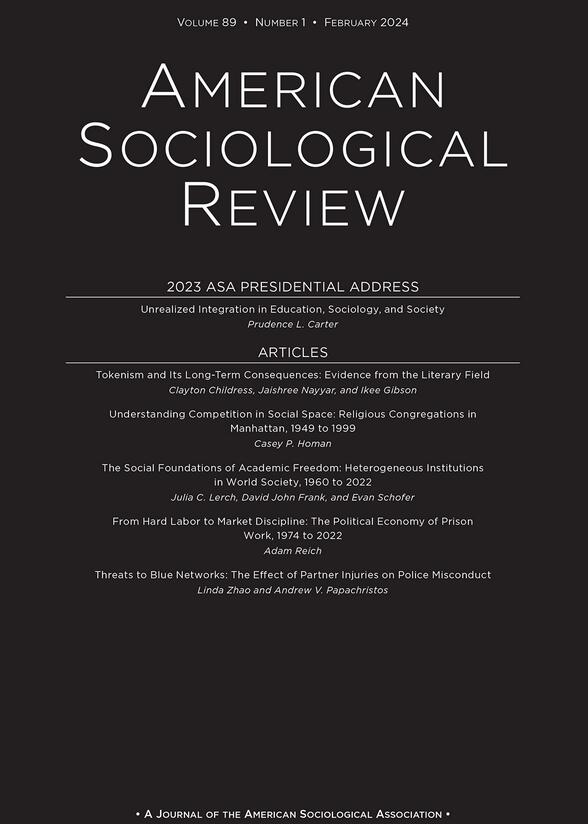木马技术:将刑事法律逻辑偷运到医疗实践中
IF 6.2
1区 社会学
Q1 SOCIOLOGY
引用次数: 0
摘要
在一场棘手的用药过量危机的阵痛中,美国药剂师开始从事一项意想不到的工作--监督病人。当代社会学理论无法解释其中的原因。关于职业和一线工作的理论表明,职业严守辖区,并根据自身领域的逻辑做出决定。刑事法律扩张理论表明,在过去几十年中,非执法领域已经围绕犯罪进行了重新定位,但过去的研究主要关注宏观层面的后果。本文以药剂师和阿片类药物为例,从微观层面提出了专业领域围绕犯罪调整方向的理论--特洛伊木马框架。通过对六个州的 118 名药剂师进行纵向和横向访谈,我揭示了处方药监控项目(PDMPs)--一种为执法部门设计但在医疗保健领域实施的监控技术--的使用如何与一系列现场条件相结合,促使药剂师对患者实施监控。处方药监控程序是一种特洛伊木马技术,因为它的使用改变了药剂师的日常工作、与其他专业人员的关系以及对其专业角色的构建。因此,药剂师将病人带离医疗系统,使他们容易受到刑事法律系统的侵害。文章最后提出了政策建议,并讨论了特洛伊木马框架的未来应用。本文章由计算机程序翻译,如有差异,请以英文原文为准。
Trojan Horse Technologies: Smuggling Criminal-Legal Logics into Healthcare Practice
In the throes of an intractable overdose crisis, U.S. pharmacists have begun to engage in an unexpected practice—policing patients. Contemporary sociological theory does not explain why. Theories of professions and frontline work suggest professions closely guard jurisdictions and make decisions based on the logics of their own fields. Theories of criminal-legal expansion show that non-enforcement fields have become reoriented around crime over the past several decades, but past work largely focuses on macro-level consequences. This article uses the case of pharmacists and opioids to develop a micro-level theory of professional field reorientation around crime, the Trojan Horse Framework. Drawing on 118 longitudinal and cross-sectional interviews with pharmacists in six states, I reveal how the use of prescription drug monitoring programs (PDMPs)—surveillance technology designed for law enforcement but implemented in healthcare—in conjunction with a set of field conditions motivates pharmacists to police patients. PDMPs serve as Trojan horse technologies as their use shifts pharmacists’ routines, relationships with other professionals, and constructions of their professional roles. As a result, pharmacists route patients out of the healthcare system and leave them vulnerable to the criminal-legal system. The article concludes with policy recommendations and a discussion of future applications of the Trojan Horse Framework.
求助全文
通过发布文献求助,成功后即可免费获取论文全文。
去求助
来源期刊

American Sociological Review
SOCIOLOGY-
CiteScore
13.30
自引率
3.30%
发文量
35
期刊介绍:
The American Sociological Association (ASA) is a non-profit membership association established in 1905. Its mission is to advance sociology as a scientific discipline and profession that serves the public good. ASA is comprised of approximately 12,000 members including faculty members, researchers, practitioners, and students in the field of sociology. Roughly 20% of the members work in government, business, or non-profit organizations.
One of ASA's primary endeavors is the publication and dissemination of important sociological research. To this end, they founded the American Sociological Review (ASR) in 1936. ASR is the flagship journal of the association and publishes original works that are of general interest and contribute to the advancement of sociology. The journal seeks to publish new theoretical developments, research results that enhance our understanding of fundamental social processes, and significant methodological innovations. ASR welcomes submissions from all areas of sociology, placing an emphasis on exceptional quality.
Aside from ASR, ASA also publishes 14 professional journals and magazines. Additionally, they organize an annual meeting that attracts over 6,000 participants. ASA's membership consists of scholars, professionals, and students dedicated to the study and application of sociology in various domains of society.
 求助内容:
求助内容: 应助结果提醒方式:
应助结果提醒方式:


